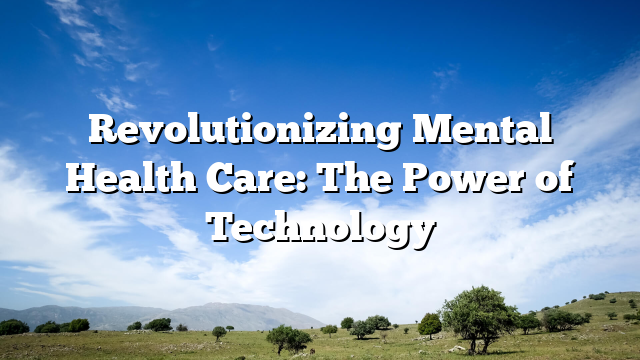Access to appropriate treatment continues to be a barrier for many people, particularly those living in rural areas and communities that are underserved, despite the fact that mental health is an essential component of both overall health and well-being. On the other hand, technology offers the ability to close this access gap and make mental health treatment more readily available to individuals all around the world. These developments are revolutionizing the landscape of mental health treatment, making it simpler for patients to obtain the care they need, when and when they need it. Examples of these breakthroughs include teletherapy, smartphone applications, and other similar technologies.
You might also like to read: 7 Technological Advancements Within the Medical Field You Should Know About
Teletherapy: Teletherapy is one of the most important developments that has come about as a result of the intersection of technology and mental health treatment. This technique of providing remote therapy services makes use of video conferencing to link patients with certified therapists from any location in the world where they have access to the internet. Teletherapy has several advantages for mental health treatment, including better convenience for those who are unable to physically go to a therapist’s office, enhanced accessibility to mental health care, and a reduction in the stigma associated with seeking assistance. In recent years, there has been a rise in popularity of teletherapy, which has led to an increase in the number of insurance companies that cover these services.
Mobile Apps: Apps for Mobile Devices One further manner in which technology is helping to improve access to mental health treatment is via the use of mobile application software (apps). There are currently a large number of applications for mental health accessible on the market. These apps provide a variety of services, ranging from monitoring one’s mood and providing access to various self-help resources to providing virtual therapy sessions with certified therapists. People who are battling with anxiety, sadness, or other common mental health difficulties and are looking for easy and inexpensive methods to obtain treatment may find that these applications are very beneficial. In addition, there are a lot of applications for mental health that are free to download, which makes them available to everybody and everyone regardless of their financial situation.
You might also like to read: How can the US healthcare system prevent medical identity theft?
Artificial Intelligence: Artificial intelligence (AI) is also finding its way into the field of mental health care. New tools that are driven by AI are now being created to assist in the diagnosis and treatment of mental health issues. For instance, several AI algorithms are now undergoing training to recognize patterns in voice and text that may point to the existence of mental health problems such as sadness or anxiety. These tools are intended to supplement the work of qualified therapists rather than take their place. They may be used to assist in the identification of individuals who may need assistance and the expedited establishment of appropriate treatment for such individuals.
Big Data: In addition, the availability of mental health treatment is being helped by big data’s contributions. Researchers are obtaining new insights into the underlying causes of mental health issues and generating more effective therapies by collecting and analyzing massive volumes of data on mental health and treatment results. Additionally, big data is being utilized to discover patterns and trends in mental health care, which may assist drive future study and increase access to care. This can help enhance access to treatment.
Virtual Reality: The use of virtual reality (VR), another interesting area of technology, is now being investigated for its potential to enhance the delivery of mental health treatment. Individuals who suffer from anxiety, phobias, and other mental health issues may find that virtual reality (VR) allows them to immerse themselves in simulations of real-world places and circumstances, which assists them in coping with and managing these illnesses. Additionally, virtual reality (VR) has the potential to serve as an effective and cost-efficient alternative to conventional therapy for the treatment of diseases such as post-traumatic stress disorder (PTSD).
You might also like to read: Why are US Hospitals Choosing Iris Biometrics for Patient Identification?
Conclusion
Technology is revolutionizing mental health treatment and making it easier for individuals all around the world to get the help they need. These breakthroughs are breaking down barriers and making it simpler for patients to get the treatment they need, when and when they need it. Some examples of these developments are teletherapy, smartphone applications, artificial intelligence, and virtual reality. There is a good chance that we will see even more breakthroughs in the area of mental health care as technology continues to grow. Furthermore, we may anticipate that access to treatment, the quality of care, and the results will continue to become better over time.

Darren Trumbler is a versatile content writer specializing in B2B technology, marketing strategies, and wellness. With a knack for breaking down complex topics into engaging, easy-to-understand narratives, Darren helps businesses communicate effectively with their audiences.
Over the years, Darren has crafted high-impact content for diverse industries, from tech startups to established enterprises, focusing on thought leadership articles, blog posts, and marketing collateral that drive results. Beyond his professional expertise, he is passionate about wellness and enjoys writing about strategies for achieving balance in work and life.
When he’s not creating compelling content, Darren can be found exploring the latest tech innovations, reading up on marketing trends, or advocating for a healthier lifestyle.
